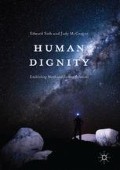Abstract
The concept of human rights and the Internet is new. Both the theoretical framework and the practical application of human rights to the Internet and our online lives are not yet clear. The concept that the Internet could be a place for human rights is contested, with some regarding it as a rights free space and others regarding it as a place representing the ultimate in freedom and rights. The nature and characteristics of dignity online are still being defined, but already it is clear that dignity online can take different forms from dignity offline. This chapter explores how human rights theory and practice has developed to establish the worth of our lives online and to establish new solutions for new forms of human rights violations online.
Access this chapter
Tax calculation will be finalised at checkout
Purchases are for personal use only
References
APC Internet Rights Charter. November 2001. www.apc.org.
Barlow, J. P. Declaration of the independence of cyberspace (Switzerland, 1996)
Comninos, A. (2011). Twitter revolutions and cyber‐crackdowns: The use of user-generated content and social networking in the Arab spring and beyond. Association for Progressive Communications.
Electronic Frontier Foundation and others. (2013). The International Principles on the Applicaiton of Human Rights to Communication Technologies, available at www.necessary and proportionate.org.
Fascendini, F., & Fialova, K. (2011). Voices from digital spaces: Technology related violence against women. Association for Progressive Communication and Women’s Network Support Program.
Hammond v New Zealand Credit Union Baywide. Human Rights Review Tribunal (2015, March 2). 027/2013.
Harmful Digital Communications Act (2015). New Zealand.
Hawtin, D. (2011). Internet charters and principles: Trends and insights. Global Information Society Watch. HIVOS and Association for Progressive Communications.
Horner, L. (2011). A human rights approach to the mobile Internet. Association for Progressive Communication, April. www.apc.org.
Human Rights Committee. (2011). Draft general comment no. 34 (upon completion of the first reading by the Human Rights Council. CCPR/C/GC/34/CRP.6 3 May, 2011).
International Telecommunication Union. (2015). ICT facts and figures. Switzerland.
Internet Governance Forum. www.intgovforum.org.
Law Commission. (2012). Harmful digital communications: The adequacy of current sanctions and remedies. Summary of Ministerial Briefing Paper, Wellington.
Leiner, B. M. and Others. (2010). Brief history of the Internet. Internet Society. Available at: http://www.internetsociety.org/internet/what-internet/history-internet/brief-history-internet. Law Commission. http://www.lawcom.govt.nz/our-projects/regulatory-gaps-and-new-media.
Liddicoat, J. (2011). Human rights online: New issues and threats. Association for Progressive Communications. www.apc.org.
Rodriguez, K. (2014). A principled fight against surveillance Global Information Society Watch. Hivos and Association for Progressive Communications.
Silva, A. C. (2014). The myth of global online surveillance exempt from compliance with human rights. Global Information Society Watch (Hivos and Association for Progressive Communications).
Smith, P. et al. (2010). World Internet project New Zealand: The Internet in New Zealand 2009. World Internet Project New Zealand, Institute of Culture, Discourse and Communication. Auckland: Auckland University of Technology.
Souter D. (2012). Human Rights and the Internet: a review of perceptions of human rights organisations. South Africa: Assocation for Progressive Communications.
The Dynamic Coalition for Internet Rights and Principles, Charter of Human Rights and Principles for the Internet, Internet Rights and Principles Coalition. (2010). www.Internetrightsandprinciples.org.
United Nations. (2012). Human Rights Council. The promotion and protection of human rights on the Internet. Resolution 20/8, 16 July 2012 (A/HRC/RES/20/8).
United Nations. (2014). Office of the high commissioner for human rights: The right to privacy in the digital age: A/RES/69/166. http://www.un.org/en/ga/search/view_doc.asp?symbol=A/RES/69/166.
United Nations Guiding Principles on Business and Human Rights, (June 2011), United Nations, Geneva (also known as the Ruggie Principles).
United Nations. Annual report of the special Rapporteur on freedom of expression, Frank La Rue A/HRC/17/27.
United Nations Secretary-General. (2006). Report: In‐depth study on all forms of violence against women, para. 155.
Woodard, C. (2003, July 1). Estonia, where being wired is a human right. Christian Science Monitor.
Author information
Authors and Affiliations
Corresponding author
Editor information
Editors and Affiliations
Copyright information
© 2017 The Author(s)
About this chapter
Cite this chapter
Liddicoat, J. (2017). Dignity Online and Offline. In: Sieh, E., McGregor, J. (eds) Human Dignity. Palgrave Macmillan, London. https://doi.org/10.1057/978-1-137-56005-6_1
Download citation
DOI: https://doi.org/10.1057/978-1-137-56005-6_1
Published:
Publisher Name: Palgrave Macmillan, London
Print ISBN: 978-1-137-56004-9
Online ISBN: 978-1-137-56005-6
eBook Packages: Social SciencesSocial Sciences (R0)

